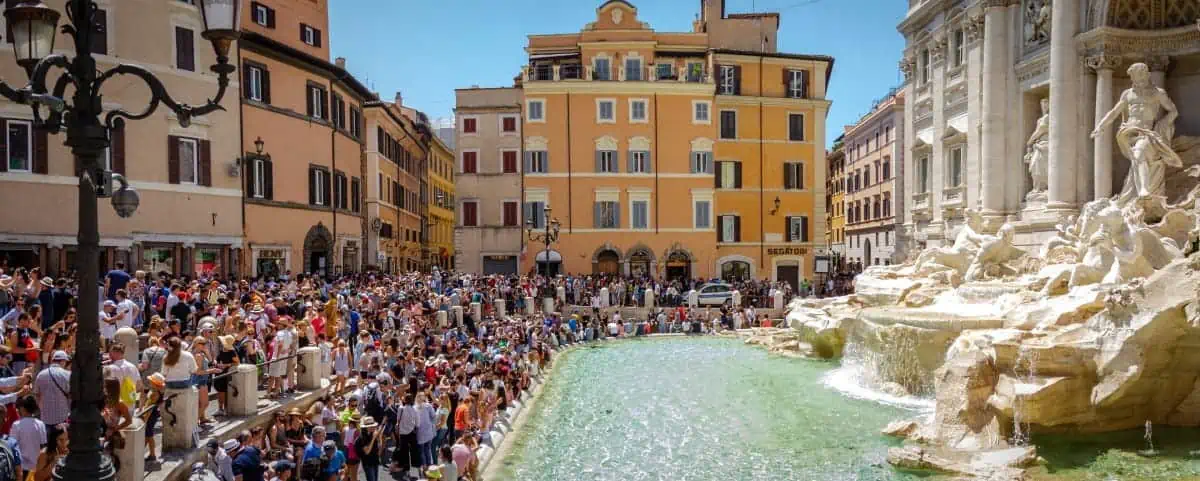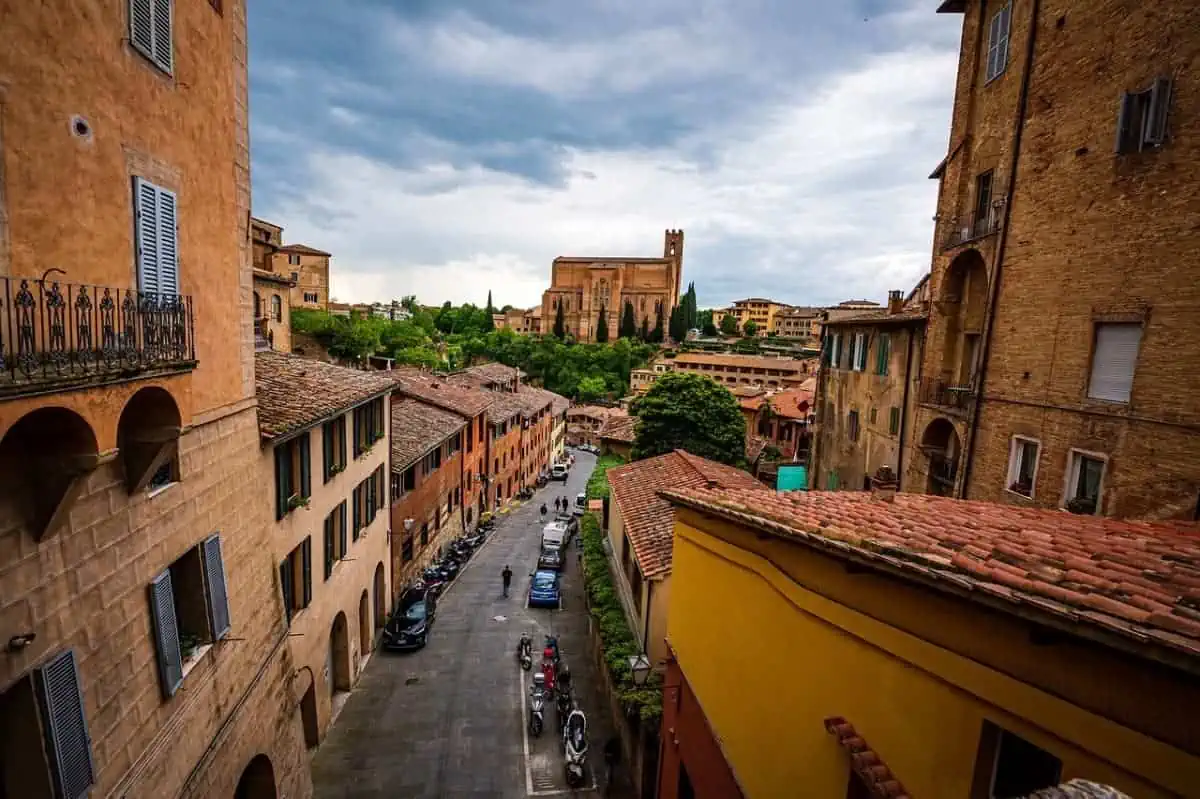With the success of TV shows like “White Lotus,” the call of la dolce vita beckons. Moving to the land of pizza and pasta is a dream for many, but it’s important to consider the true pros and cons of living in Italy before you make any major decisions.

As an Italian citizen living in Australia, I’ve visited and studied in the motherland many times, so I can confirm that some of your Italian fantasies are correct: the food in Italy really is better than the Italian food you’ll get anywhere else, and the relaxed pace of life is real (and good for the soul!).
However, that lenient attitude toward work can also mean that, as a member of the public in Italy, things can be slow-moving and frustrating. While Italy has a great healthcare system and is statistically safe to live in, there are other issues that pop up, such as dangerous cities, a high unemployment rate and a high cost of living.

Only you can be the judge of whether swapping your car for a Vespa is the right move for you. Let’s discuss the pros and cons of living in Italy to help you decide.
A Quick Overview & Comparison
| Pros of Living in Italy | Cons of Living in Italy |
| Good location | Lots of tourists |
| Authentic Italian cuisine | Language barrier |
| Variation between regions | High unemployment rate |
| Great healthcare system | High cost of living |
| Work-life balance | Poor government services |
| It’s statistically safe | Dirtiness |
The Pros of Living in Italy
1. Prime location
With half of the country firmly in the Mediterranean, and the other half leaning more towards central Europe, Italy is a prime location for those who are interested in traveling.
Particularly if you come from outside of Europe, where the idea of jetting to Paris or Athens is synonymous with a long-haul flight, Italy’s close proximity to several destinations is a major benefit.
To put this into perspective, the flight time from Rome is around 1.5 hours to Dubrovnik, just under 2 hours to Ibiza, just over 2 hours to Paris and Berlin, just over 2.5 hours to London, and just over 3 hours to Cairo.
2. Authentic Italian cuisine
Undoubtedly, one of the biggest advantages of living in Italy is the chance to enjoy authentic Italian cuisine.
You can get Italian food all over the world, but living in Italy gives you direct access to dishes made with superior, locally sourced ingredients, which inevitably taste better.

Living in Italy, you’ll also get the chance to dive deeper into the complexities of Italian dishes.

In America or the U.K., Italian food is considered a singular cuisine, but the truth is every region has its own unique cooking methods and signature plates. The food in the regions of the north is vastly different from the food of the south.
3. Variation between regions
Not only is the food different between the regions of Italy, but the lifestyle and experiences you’ll have there will be different too. If you don’t like living in one Italian city, chances are it’s going to be very different elsewhere, so there’s a lot of room for all living styles and life goals.

For example, living in an apartment complex in a northern industrial city such as Turin would be completely different from living in the Tuscan countryside, which would also be different from living in a small beachside village in the south.
4. Great healthcare system
Italy has one of the world’s greatest healthcare systems. According to the Commonwealth Fund, Italian residents have access to free inpatient care, primary care, and health screenings.
There are also benefits for hospice care, home care, specialty care, preventive medicine, and maternity care, plus pregnant women, children, low-income earners, and those with long-term diseases may receive concessions.
The Italian Health System Review published in Health Systems in Transition in 2022 found that Italians generally have high life expectancies (though this slightly dropped in 2020 as the country was hit so hard by the COVID-19 pandemic). The average life expectancy was 83.6 years in 2019.
5. Work-life balance
“La dolce vita” isn’t just a saying. Italians genuinely take life at a slower pace than those abroad. The maximum working week is 40 hours and family time is a national priority.
The average lunch during the working day in Italy is 90 minutes, but when employers reduce this time, it’s so employees can work shorter days.

In some parts of Italy, the tradition of the siesta or riposo is still upheld, where businesses close around 12:30 p.m. and open again around 3 p.m.
While this might be frustrating for those who are used to getting lots done during the day, it’s a great reminder to slow down.
6. It’s statistically safe
The 2023 Global Peace Index lists Italy as the 34th safest country in the world. This puts it ahead of the United Kingdom, South Korea, France, and the U.S.A. The Index takes into account general safety and security, as well as ongoing conflict.
Pickpockets and scammers do operate in Italy, particularly in tourist-heavy areas, but generally, the country has low rates of violent crime.
While Italy has an exaggerated reputation for organized crime, this generally isn’t a problem for tourists or expats in most regions.
The Cons of Living in Italy
7. Lots of tourists
Italy is one of the world’s most popular tourist destinations. World Population Review lists Italy as one of the top five most visited countries of 2023.
Some cities naturally attract more crowds than others, but you can find tourist hotspots all over the country, from Milan, Venice, and Lake Como in the north, to Rome, Florence, and Pisa in central Italy, to Sorrento and Capri in the south.

As a result, living in Italy can certainly feel more chaotic and crowded than what you’re used to—but of course, this depends on where you’re coming from. A New York City local probably won’t mind the masses of people in certain parts of Italy, but if you’ve always lived in a small town, certain Italian cities may be deal breakers.
That said, there are lesser-known areas in Italy where you won’t have to deal with scores of tourists. This con only applies when you have dreams of living in iconic areas.
8. Language barrier
Italians are friendly, but they’re not known for their patience when it comes to English speakers not bothering to learn any Italian when visiting or living in Italy.
Some countries with foreign national languages are known for their English-speaking cultures, such as Iceland and the Netherlands, but in Italy, you’ll have to speak some Italian or you’ll be very lost.
The good news is Italian is a phonetic language and is relatively easy for an English speaker to learn. It’s also a Romance language, so if you know any French, Spanish, or Latin, you’re likely already familiar with several Italian words.
9. High unemployment rate
Unfortunately, Italy does have what’s considered a high unemployment rate, which was 7.4% as of June 2023.
An employment rate of between 4 and 6% is thought to be healthy for most economies, so it may be more difficult to land a job in Italy than other countries.
It should be noted, however, that the unemployment rate has actually dropped in Italy, and is currently the lowest it’s been since April 2009.
You’re likely to have the most trouble with finding employment in Italy if you’re not an Italian speaker. Some of the most in-demand jobs in Italy to consider as an expat include becoming a tour guide, nursing, teaching English with these TEFL courses, and becoming a sales representative.
10. High cost of living
While food might be affordable in Italy, the cost of living across most other categories is generally quite high, at around 1.38 times more expensive than the world average. Generally, an average Italian salary is enough to cover 1.3 months’ worth of living expenses.

Naturally, salaries are generally higher in some cities than in others—you can expect to make more money in major cities like Milan and Rome than you can in some of the cities of the south, such as Palermo.
Consequently, the cost of living is also generally lower or higher depending on average incomes.
11. Poor government services and administration
For all its benefits, Italy isn’t the most organized country on the planet.
Many expats and tourists will confirm that trying to use certain government or public services can be frustrating, as they are generally slow-moving and sometimes incompetent. This may also be influenced by the general “relaxed” attitude towards administration.
I personally saw this in Italy after asking a rail station staff member in Prato (in Italian) for directions to my train and receiving a literal shrug in response.
There was also the time the X-ray machine flagged my bag at the Accademia Gallery of Florence on my way to see Michelangelo’s David, and the security staff let me go through without checking it because they were late for their lunch break.
12. Dirtiness
Italy is home to some of the most beautiful scenery in the world, so it might come as a surprise to find that some of the cities have a problem with rubbish and grime.
This is to be expected in cities that are hundreds (if not thousands) of years old and are visited by millions each year, but Italy does also have a problem with rubbish collection.

The overflowing trash is a particular problem in Rome, which became so bad in 2022 that it started attracting wild animals. The issue partly stems from the Malagrotta landfill company closing in 2013 due to unmet environmental standards.
Garbage collection and illegal toxic waste dumping is also an ongoing problem in Naples.
FAQ’s



![Is Istanbul Safe? [2025 Insider Tips]](https://waytostay.com/wp-content/uploads/2023/12/Is-Istanbul-Safe-400x200.jpg)

